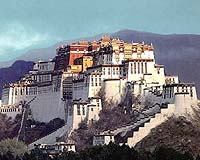 |
Beijing (AFP) Oct 19, 2009 More than 50 years after a major overhaul of the way in which Chinese characters are written, a far less ambitious project to simplify just a few dozen ideogrammes has sparked huge controversy here. The government has put forward proposals to change 44 characters out of the 3,500 most used, or 1.25 percent of the total, "to adapt to the requirements of the information era, the evolution of language and the development of society." After eight years of reflection and expert consultations in China and abroad, the education ministry and the State Language Work Committee called on members of the public for their opinions -- a first for such a reform. The project was not expected to spark any major concerns, with just a few strokes removed from characters here and there. For example, "cha," or tea, would lose a tiny upward stroke at its base -- a change that is already noticeable on some shopfronts in Beijing. "Xin," which means new, would also get rid of its little upward line. But dissenting voices have run riot, particularly on the Internet. According to polls by major Chinese web portals or newspaper websites, more than 80 percent of online users are opposed to the project. They say the reform might only affect a few characters, but these are used often and their modification would have an important impact on dictionaries, school books, signs, publishers... and the Chinese themselves. "Chinese characters are a precious part of the cultural heritage left to us by our ancestors thousands of years ago," one net user in eastern Shandong said in a comment posted on sina.com. "We should respect them and protect them, not change them on a whim." Liu Jingbo, a calligraphy professional who regularly organises exhibitions in Beijing, said the changes would not go against the nation's history. "Chinese characters come from ancient history, but it is possible to reform them, respecting certain rules, if it helps to make life easier for people," he said. "A lot of people, such as the elderly, are however opposed to this as they were used to these characters." In the 1950s, when the government decided to simplify more than 2,000 characters, the philologist Chen Mengjia paid dearly for his opposition to this huge reform project. Accused of being a "rightist" and sent to a labour camp in central China, he subsequently committed suicide in Beijing in 1966 after being subjected to public criticism sessions at the start of the turbulent Cultural Revolution. Experts say the new controversy highlights the strong public attachment to the Chinese form of writing -- a unifying factor within the massive country of 1.3 billion people, which boasts many languages and dialects. "Of the first measures taken by the first emperor after he defeated all other kingdoms, the unification of writing was not insignificant," said Olivier Venture, a Beijing-based researcher for the French School of Asian Studies. "It is extremely important -- it is seen as the bond that unites Chinese culture, as part of the nation's identity. A lot of things change but people can always look to writing, even if in fact it always evolves," he said. Faced with the surge of protests on the Internet and in the press during the consultation phase in August, the education ministry and the commission decided to wait, saying nothing had been decided and that discussions were ongoing. "We are civil servants -- our responsibility is to serve the people, and if the people are opposed, we will not budge," Li Ningming, an official at the commission, said in comments broadcast on state television. Share This Article With Planet Earth
Related Links China News from SinoDaily.com
 Tibet sees record tourism despite restrictions: state media
Tibet sees record tourism despite restrictions: state mediaBeijing (AFP) Oct 14, 2009 A record 4.75 million tourists visited China's Tibet in the first nine months of 2009, more than twice as many as in all of 2008, when unrest led to a ban on foreigners, state media said Wednesday. The local government slashed the cost of holiday packages, hotels and tickets to draw tourists back to the picturesque Himalayan region, Xinhua news agency reported. "It's a high point for Tib ... read more |
|
| The content herein, unless otherwise known to be public domain, are Copyright 1995-2009 - SpaceDaily. AFP and UPI Wire Stories are copyright Agence France-Presse and United Press International. ESA Portal Reports are copyright European Space Agency. All NASA sourced material is public domain. Additional copyrights may apply in whole or part to other bona fide parties. Advertising does not imply endorsement,agreement or approval of any opinions, statements or information provided by SpaceDaily on any Web page published or hosted by SpaceDaily. Privacy Statement |